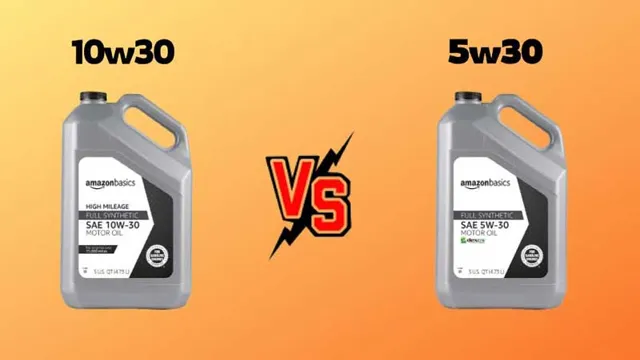Generators are an essential tool to have during power outages or emergency situations. They provide power to homes or businesses when the main grid fails. However, maintaining generators can be a bit puzzling, especially when it comes to selecting the right type of oil.
Two common types of motor oil used in generators are 5W30 and 10W30. Both are recommended for small engines and have their advantages and disadvantages. But, which one should you use for your generator? In this blog post, we will explore the differences between 5W30 and 10W30 motor oils, their benefits, and which one is more suitable for your generator.
By the end of this post, you will have a clear understanding of which oil to use in your generator for optimal performance. So, let’s dive into the details and get started!
Understanding Viscosity Ratings
If you’re wondering if you can use 5W30 instead of 10W30 oil in your generator, the quick answer is it depends on the manufacturer’s recommendations. Viscosity ratings can be a bit confusing, but they essentially refer to the oil’s resistance to flow – the lower the viscosity, the easier it flows. Both 5W30 and 10W30 are multi-grade oils, meaning they have two viscosity ratings.
The first number refers to the oil’s flow at low temperatures, while the second number refers to its flow at high temperatures. 5W30 has a lower viscosity at low temperatures than 10W30, which makes it suitable for colder climates. However, 10W30 has a higher viscosity at high temperatures, making it more appropriate for hotter climates or heavy-duty usage.
Always consult your generator’s manual to ensure you’re using the appropriate oil for your specific model. Using the wrong oil can cause damage or even void the warranty.
What the numbers mean
Viscosity Ratings Viscosity ratings may seem like a foreign concept to those who are not well-versed in the world of oils and lubricants. However, understanding these ratings is crucial in determining which type of oil is best suited for your vehicle. Viscosity refers to a fluid’s resistance to flow and is measured using the Society of Automotive Engineers (SAE) rating system.
This system assigns numbers to oils, such as 10W-30 or 5W-20, which indicate the oil’s viscosity at different temperatures. The first number, followed by the “W,” represents the oil’s viscosity in cold temperature conditions, while the second number indicates its viscosity in high temperature conditions. In essence, the lower the number, the less viscous the oil, and the higher the number, the more viscous the oil.
Understanding viscosity ratings can help vehicle owners make informed decisions about oil changes and ensure their engine is running smoothly. So, the next time you’re looking at oil specifications, don’t be intimidated by the numbers because they hold great importance in ensuring your car’s longevity.

How viscosity affects your generator
Viscosity is a critical factor when it comes to the health and performance of your generator. Viscosity is the measure of a fluid’s resistance to flow, and it has a significant impact on how efficiently your engine operates. The right viscosity rating is essential to your generator’s proper lubrication, ensuring that the moving parts function correctly and efficiently.
As an owner, you should understand that high viscosity fluids are thicker and require more energy to flow; therefore, your generator may struggle to start or run efficiently. On the other hand, low viscosity fluids are more liquid, which reduces the friction between the engine parts and makes startup easier. To get the most from your generator, you need to use the right viscosity oil-rating recommended by the manufacturer.
Using 5W30 in place of 10W30
If you’re wondering whether using 5W30 instead of 10W30 oil in your generator is advisable, there’s good news. You can safely use 5W30 in place of 10W30, but it’s important to understand the differences between these two types of motor oil. The main difference lies in their viscosity, or thickness.
5W30 is thinner than 10W30, making it better suited for colder temperatures and faster flow rates. In contrast, 10W30 is thicker and provides better protection at higher temperatures and in situations where there is a lot of stress on the engine. Ultimately, which one you use depends on the specific conditions you’re operating under.
However, both types of oils can be interchanged if needed. Just make sure to check your owner’s manual for recommendations and make the switch gradually to avoid any potential issues.
Compatibility with your generator
Generator compatibility is crucial for ensuring it runs smoothly and efficiently. One of the common questions many people have when it comes to generators is whether or not they can use 5W30 instead of 10W30 oil. When it comes to choosing the right oil for your generator, it’s important to refer to the manufacturer’s recommendations.
While 10W30 may be recommended for your generator, it may be possible to use 5W30 as well. However, it’s important to keep in mind that the viscosity of 5W30 is lower than that of 10W30. This means that the oil will flow more easily, which may impact its lubrication abilities.
In addition, using the wrong oil may also impact the overall performance of the generator and even shorten its lifespan. So, it’s important to make an informed decision and choose the oil that is right for your specific generator.
Performance differences between 5W30 and 10W30
If you’re wondering whether replacing 10W30 with 5W30 motor oil is a good idea, the short answer is yes, but with some considerations. Both motor oils have their distinct properties that affect their performance. Generally, 10W30 offers better protection at higher temperatures and thicker viscosity, while 5W30 provides easier cold starting, better cold weather operation, and improved fuel economy.
However, in most applications, you can freely switch between the two without adverse effects. Still, it’s best to consult your owner’s manual for the recommended oil to use. Also, if you’re using 10W30, ensure that it meets the API classification for your engine.
All in all, the decision to use 5W30 in place of 10W30 rests on your preference and the climate in which you operate your vehicle.
Potential benefits of using 5W30
If you’re thinking about switching from 10W30 to 5W30, it may offer some potential benefits. For starters, 5W30 is designed to have improved fuel efficiency, which can lead to savings in the long run. The lower viscosity of 5W30 oil allows it to flow more easily, which means it can also provide better cold weather performance.
This can be especially helpful if you live in an area with harsh winters. Another factor to consider is that 5W30 oil is becoming more widely available, which can make it easier to find and purchase. Overall, making the switch to 5W30 could provide some potential benefits, but it’s important to always check your owner’s manual and consult with a professional mechanic to ensure you’re using the right oil viscosity for your specific vehicle.
Factors to consider before making the switch
If you’re wondering whether you can use 5W-30 instead of 10W-30 in your generator, there are several factors to consider before making the switch. One important consideration is the climate in which you will be using your generator. 5W-30 may be better suited for colder temperatures, while 10W-30 may be better for warmer temperatures.
Another important factor to consider is the manufacturer’s recommendations for your generator. Using the wrong type of oil may cause damage to your generator’s engine or void any warranty that came with it. It’s always best to consult the manufacturer’s manual and follow their recommended guidelines for the type of oil to use.
Additionally, it’s important to consider the quality of the oil you are using. High-quality oil can prolong the life of your engine and provide better performance, while low-quality oil may do more harm than good. To avoid any potential issues, it’s best to adhere to the manufacturer’s recommendations and use the recommended oil for your generator.
Manufacturer recommendations
When considering switching to a new manufacturer, there are several factors to keep in mind. Firstly, it’s essential to check the recommendations provided by the manufacturer you’re already using. Some manufacturers may require specific equipment or processes that another manufacturer may not be able to provide.
It’s important to ensure that the new manufacturer meets all the same standards and requirements as the previous one. Secondly, consider the cost and quality of the new products. Lower prices may often mean lower quality, so it’s critical to compare the products’ prices and quality between manufacturers before making the switch.
Thirdly, take into account the lead time for the new manufacturer. Is the lead time suitable for your needs, or will it cause unwanted delays in production? Lastly, consider the location of the new manufacturer. Is it local, international, or out of state? If you’re ordering from overseas, you may incur additional shipping fees or longer delivery times.
Moreover, consider the ease of communication. When dealing with a manufacturer, communication is critical to ensure that your requirements are being met. Keep these factors in mind when making the switch, and be sure to consult with your manufacturing team to help make the best decision for your business.
Weather and climate
When it comes to making the switch to a new location, factors such as weather and climate are undoubtedly a significant consideration. It’s essential to research factors such as temperature, precipitation, and natural disasters specific to the area you are considering. For instance, if you are moving to a region with a higher risk of hurricanes or tornadoes, taking precautions to ensure your safety and prepare your home for severe weather is crucial.
Additionally, considering the impact that such weather patterns could have on your daily life, such as potentially longer commute times or limited outdoor activities, can help you make an informed decision. By weighing such variables, you can better evaluate whether a new location’s climate and weather patterns align with your lifestyle preferences and overall wellbeing.
Conclusion
In conclusion, using 5w30 instead of 10w30 in your generator may seem like a small decision, but it can have big consequences. While it may seem like a quick fix, it’s always best to follow the manufacturer’s recommendations to ensure optimal performance and longevity for your generator. Plus, who doesn’t love following instructions and feeling like a responsible adult? Trust us, your generator (and your inner child) will thank you.
“
FAQs
Is it okay to switch from 10w30 to 5w30 in my generator?
It depends on the specific requirements of your generator. Check the owner’s manual or consult a professional to ensure that 5w30 is an appropriate oil to use.
What are the benefits of using 5w30 instead of 10w30 in my generator?
5w30 oil is typically thinner than 10w30, which can lead to improved fuel efficiency and better performance in extreme temperatures.
Will using 5w30 instead of 10w30 void my generator’s warranty?
It depends on the manufacturer and specific warranty terms. Check the warranty documentation or consult with the manufacturer to determine if using 5w30 will impact your warranty coverage.
Can I mix 5w30 and 10w30 oil in my generator?
It’s not recommended to mix different weight oils together. Doing so can alter the oil’s viscosity and potentially harm your generator’s engine. Stick to one type of oil for best results.


